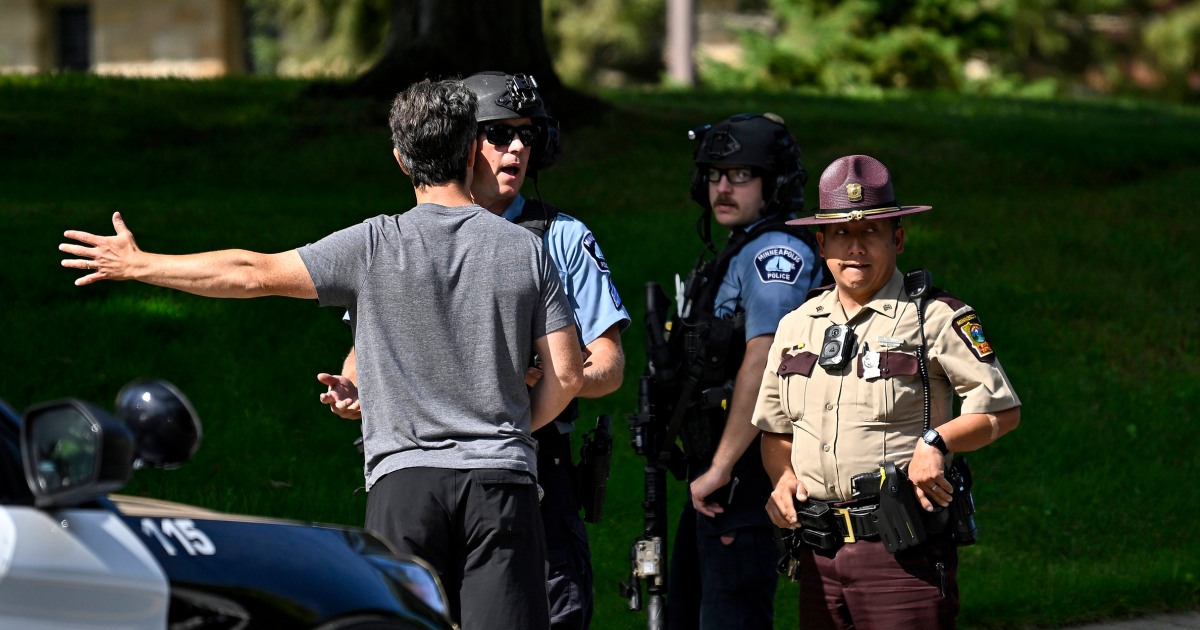
President Donald Trump is on the verge of getting billions of dollars from Congress to recruit and retain agents to carry out the mass deportation campaign that was one of the central promises of his campaign.
Trump has been on a roll in his efforts to combat illegal immigration and remove undocumented immigrants from the country, and both advocates and critics of his plans say that bolstering border security and interior enforcement will make it easier for him to execute on his vision.
The issue, a key tenet of his MAGA movement for a decade, helped him win back the White House in 2024. It remains his strongest issue, with 51% of adults approving of his handling of immigration and 49% disapproving, according to an NBC News Decision Desk poll powered by SurveyMonkey that was released this month.
Illegal border crossings, as he and other administration officials often point out, have dropped precipitously, even without the completion of a long-pursued border wall.
And the Supreme Court ruled Friday in a way that allows him to continue his push to deny the 14th Amendment’s guarantee of birthright citizenship to some people born in the U.S. — at least for now.
But the heart of his campaign to deport millions of undocumented people has been beating more slowly than he would like. Administration officials say they can kick-start it if Congress delivers on a budget measure Trump nicknamed the “big beautiful bill,” which would spend billions of dollars to boost the ranks of border agents and Immigration and Customs Enforcement officials.
The House-passed version includes $8 billion to hire an additional 10,000 ICE employees over five years, boosting the agency’s ranks by nearly 50%, and $858 million more for signing and retention bonuses. At full employment of 30,000 people, the money would cover about $28,600 per employee. Customs and Border Protection would get $2 billion to spread around for such bonuses to its larger workforce, which currently can range as high as $30,000 for new recruits.
It can be hard to hire and keep immigration agents, especially at a time when highly trained investigators who normally work on complex issues such as anti-trafficking and anti-money-laundering probes are being pulled into more routine immigration enforcement, said Chris Musto, the former assistant special agent in charge of the Homeland Security Investigations at ICE’s Newark, New Jersey, field office.
“There are hundreds of agents that are leaving,” said Musto, who retired in June 2024. “Anybody that’s eligible is departing.”
Beyond ICE, the federal government has diverted resources from across the government to focus on immigration — an indication both of the priority Trump has placed on executing his policy and the need for more help to do that.
In Los Angeles, where the administration has met resistance from state and local officials, as well as protesters, Trump deployed the National Guard to protect federal agents and Marines to bolster the Guard.
Critics predict that new money, and new agents, will mean a landscape that looks like Los Angeles across the country.
“It’s going to be unrecognizable in American history, the level of immigration enforcement, street harassment, that you will see by border patrol, ICE and all the law enforcement they have helping them out,” said David J. Bier, director of immigration studies at the nonpartisan, libertarian-oriented CATO Institute.
“The average American probably hasn’t seen an ICE raid in action, but they will if this bill passes,” Bier said. “It’s going to be everywhere.”
“Any alien who illegally enters the United States has committed a crime and is eligible for deportation,” White House spokeswoman Abigail Jackson said. “President Trump promised the largest mass deportation operation in history and a secure the border — the CATO Institute may disagree with that policy, but the American people don’t.”
White House officials say the money, part of a bigger injection that includes appropriations for detention facilities and other needs for scaling up deportation efforts, is necessary to execute on Trump’s vision.
“We got over 600,000 illegal aliens with criminal histories walking the streets of this country. We got less than 5,000 deportation officers,” Tom Homan, Trump’s border czar, said Thursday at the White House.
“More agents means more bad guys arrested, taken off the streets of this country every single day,” he added. “Every day we arrest a public safety threat or national security threat, that makes this country much safer. Who the hell would be against that?”
“While the President has already been extraordinarily successful on both fronts, the One Big Beautiful Bill is critical to fortify his success and make the progress permanent by: finishing the border wall, detaining and deporting at least one million illegal aliens every year, massively expanding our detention capacity, and hiring additional Border Patrol and ICE agents,” Jackson also said.
But for the most part, arrests and deportations under Trump have not focused on his promise to go after the “worst of the worst.” Instead, as White House officials lean on agencies to increase the raw number of enforcement actions, the vast majority of people scooped up have no criminal record.
In mid-May, White House deputy chief of staff Stephen Miller tore into ICE officials over the failure to detain more undocumented immigrants. According to two people who spoke with the attendees, Miller was “screaming” and threatening to fire senior ICE officials if they did not begin detaining 3,000 migrants a day.
Since then, the Trump administration has expressed, and then reversed, a commitment to exempt what the president called “good, long time workers” in the agricultural and hospitality industries.
The focus matters, both to members of Congress and in public opinion polls. The more Trump goes after hardened criminals, the more popular his effort is. But he has less support for workplace raids, ending temporary protections for immigrants who were given asylum in this country and blocking asylum claims.
While Americans are almost evenly split on using state and local law enforcement to aid immigration enforcement efforts and assigning more federal employees to combat illegal immigration, according to a Pew Research Center poll released this month, 54% oppose workplace raids, 55% are against building more detention facilities, and roughly 3 in 5 disapprove of ending temporary protected status and suspending asylum claims.
There are divisions in Congress. Democrats have been nearly uniformly opposed to Trump’s mass deportation efforts, with most Republicans fully supportive.
But there are small signs of dissent within the GOP.
The Senate’s version of the reconciliation bill is still being finalized but, after a fight between Budget Committee Chairman Lindsey Graham, R-S.C., and Homeland Security and Government Affairs Committee Chairman Rand Paul, R-Ky., it is likely to reflect the House-passed measure. Paul, who wants the government to spend less, had wanted to scale back. His draft would have assigned $2 billion to Customs and Border Protection — for hiring and training — and less than $500 million for investigators at ICE.
The result of increased spending, advocates and critics say, will enable immigration enforcement officers to execute Trump’s mass deportation program on a grander scale.
Trump administration officials naturally focus on the public safety aspect of rounding up hardened criminals, while critics, including some Republicans, have raised objections to the detention of people in the country illegally who have not committed crimes. Earlier this month, a half-dozen House Republicans sent a letter to ICE urging the agency to put its focus on violent offenders, not people with a “clean record.”
The CATO Institute’s Bier cited data this week showing that 71% of the people ICE arrested and 67% of the people detained by ICE in the first week of June had no criminal convictions. Nearly half of the 55,000-plus migrants in ICE detention as of June 20 had no convictions or criminal charges pending, according to an NBC tracker of data compiled by the ICE and CBP agencies.
“He’s shifted law enforcement away from enforcing criminal law,” Bier said of the president, “and focused on nonviolent, peaceful people.”








